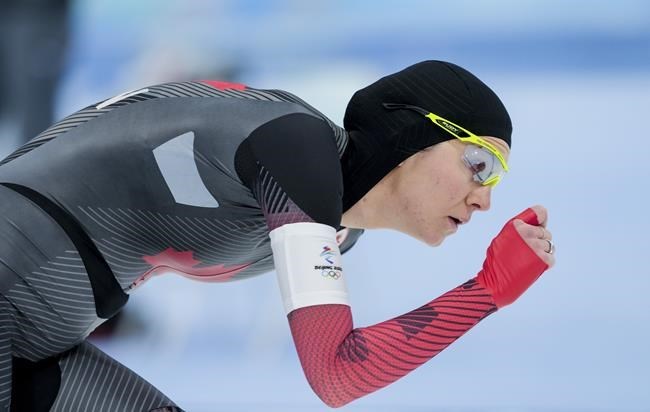BEIJING ŌĆö An athlete's preparation to compete on sport's biggest stage can feel consuming, and so Isabelle Weidemann found balance and perspective inside the emergency room of Calgary's Foothills Hospital.
The long-track speedskater won a complete set of medals in Beijing, and was named sa╣·╝╩┤½├Į's flag-bearer for Sunday's closing ceremonies.
The 26-year-old from Ottawa hopes to work in the health-care field and is contemplating medical school. She volunteered in the emergency room during the COVID-19 pandemic -- risky, perhaps, for one of sa╣·╝╩┤½├Į's finest athletes ahead of the Games, but an experience she cherished. ┬Ā
"It gave me such a view of the outside world and of perspective," Weidemann said Sunday. "In sport, we're often under this bubble of performance, and don't look anywhere else, just focus on training and focus on performance and being elite, and you lose kind of track of the outside world.┬Ā
"That's not the reality, especially during COVID, and volunteering just brought me back all the time. I struggle a little bit in sport, we focus on ourselves so, so much, especially an individual sport, and I want to be able to give back to the community and I really, really enjoyed it."
Weidemann, Ivanie Blondin and Val├®rie Maltais captured gold in the team pursuit. Weidemann added a silver in the 5,000 metres.┬Ā
Her bronze in the 3,000 metres on Feb. 5 was sa╣·╝╩┤½├Į's first medal in Beijing, and so bookending her Games by leading sa╣·╝╩┤½├Į's team into Bird's Nest Stadium was the perfect finish.
"It's never been something that I even thought I'd be able to do," Weidemann said on the flag-bearer honours. "These Games have been so, so incredible. And I feel like every day, we're piling on more and more and I haven't quite processed it all. I'm having a lack of words and a lack of emotions and I have no tears left, IŌĆÖve cried at every event now.┬Ā
"I really look forward to kind of being able to go home and reflect on everything that's happened."
Weidemann is completing a combined degree in biology and geology at the University of Calgary, and said her schoolwork in Beijing was a welcome distraction. Part of her work was learning how to code.
"At the Olympics, you spend so much downtime as you kind of ramp into competing, and it's very easy to get into your head a lot," she said. "So I use school, often to kind of to distract me and to pull me out of that. (The schoolwork) was a little bit crazy, but I don't regret it."
Weidemann took up her sport when she was 12. A "tall gangly kid," she wasn't particularly talented in sports, even speedskating. She has teammates now who used to lap her on the oval. She's not particularly co-ordinated, she said, nor good in the gym.┬Ā
"There are so many like aspects of me that scream 'not athletic.' You do what you can with what you've got," said the six-foot-two skater.┬Ā
"I did learn very quickly, if I worked harder, if I did more, I could be better," she said. "I found that in school as well. I struggled a lot in school as a kid. I was hyperactive and didn't work well in the classroom."
Weidemann narrowly missed a medal in the team pursuit in her Olympic debut in Pyeongchang. She'd been so intent on climbing the medal podium, only to go home feeling "very sour." Four years later, it was all about the process. The results took care of themselves.┬Ā
"The last Olympic Games, I wanted to medal so badly. It didn't happen. This Olympic Games, I went in thinking 'I'm here to skate my best. I'm here to show all the work that I've done and be grateful for this opportunity. If that results in medals, then I'll be so happy with that. If it doesn't, then I will also be happy with that.'
"Going in with that predetermined 'this is where I'm at' gave me a lot of power and it allowed me to kind of find the flow in skating. Just let go and just skate and enjoy."┬Ā
She shared the perspective from her Pyeongchang experience with teammates who were disappointed with their results in Beijing.
"Sometimes we need a little bit of time away from the Games and performances, to be able to reflect and it took me a while to find happiness and pride in the way that I competed in 2018. You only get that from time away from the sport," she said.┬Ā
"I have teammates who have been sad with their performances, but they've shared in my joy. It's been so special to be able to celebrate with them and for them to feel personally like they didn't accomplish what they wanted to. But to then stand with me and share in my success. And that's meant so much."
Weidemann became the second Canadian long-track athlete to win more than two medals at a single Winter Games. Cindy Klassen won five medals in 2006.
"(Weidemann) not only had incredible performances on the ice, she was also an amazing teammate through her support and positive attitude before, during and after competition," Catriona le May Doan, Team sa╣·╝╩┤½├ĮŌĆÖs chef de mission, said in a statement.
Short-track speedskater Charles Hamelin and women's hockey star Marie-Philip Poulin carried the flag into the opening ceremonies on Feb. 4. They both went on to capture gold at the Games.
Damian Warner, who captured Olympic decathlon gold last summer, was sa╣·╝╩┤½├Į's flag-bearer at the Tokyo closing ceremony.┬Ā
This report by The Canadian Press was first published Feb. 20, 2022.
Lori Ewing, The Canadian Press

